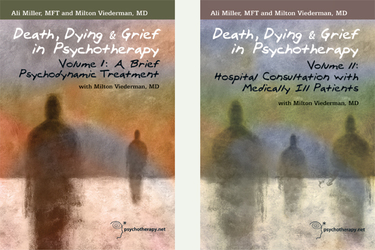 by Milton Viederman
by Milton Viederman
Therapists of all orientations will benefit from seeing how psychoanalytic and psychodynamic principles can be effectively adapted to short-term therapy with clients and patients facing issues of grief, death and dying.
Full Description:
Volume I: A Brief Psychodynamic Approach Over the course of four actual sessions, Milton Viederman, MD demonstrates a psychoanalytic approach to working with grief. Paying detailed attention to the subtle nuances of the therapeutic relationship, Viederman adapts the principles of psychoanalysis to a course of brief therapy. Pat is the primary caregiver for her dying husband and is experiencing the grief and fear around his impending death. Forming an interpretation of Pat's core conflict and elaborating this theme throughout the sessions, Viederman helps Pat explore the early life experiences that give meaning to her current emotional responses. He builds rapport and trust with this open and engaging client, offering her a supportive environment in which true insight is produced.In a poignant follow-up session, Pat reveals that the therapy was instrumental in helping her be at peace with her husband's death. Volume II: Hospital Consultation with Medically Ill PatientsMilton Viederman, MD, brings his psychoanalytic orientation to actual hospital consultations with cancer patients. Milton Viederman, MD, brings his psychoanalytic orientation to actual hospital consultations with cancer patients. In this companion volume, Viederman continues his exploration of the application of psychoanalytic principles to brief therapy. While many of us feel comfortable meeting clients on our own turf, we are often less certain how to navigate the therapeutic relationship in a hospital setting with visibly ill patients. Working quickly to assess the conscious and unconscious coping mechanisms that affect the patient's experience of illness and treatment, Viederman's main objective is to create a supportive relationship and relive patient distress. Interspersed with illuminating commentary, Viederman skillfully demonstrates when to probe defensive structures and when to leave them alone so as not to increase the patient's anxiety.
Length of DVD: 1:21:00
ISBN: 978-1-60124-220-4
A senior and skilled clinician introduces us to five patients with terminal or life-threatening illnesses. We learn about their experiences as they confront pain, the anticipation of death, the problems of treatment, the crises that emerge in intimate relationships, and their strategies for coping. We also learn how an expert understands these issues and uses that understanding in helping patients cope more effectively. This is an invaluable educational tool for all who work with dying patients, and particularly for medical students, residents, and other psychiatrists who consult in general medical settings.
- Robert Michels, MD, Professor of Psychiatry, Weill Cornell Medical College These outstanding videos are invaluable aids in the teaching of psychotherapy. Dr. Viederman demonstrates just how he approaches and explains patient suffering from loss and from physical illness. The major benefit is the opportunity that Viederman offers to see the patient in different ways and with different theories.
- Arnold Goldberg, MD, Professor of Psychiatry, Rush Medical College; Training and Supervising Analyst, Institute for Psychoanalysis, Chicago One of American's most gifted psychotherapists, Professor Milton Viederman, has given us an opportunity to witness his science, art, and wisdom in establishing an effective therapeutic relationship with patients with severe medical illnesses. The therapeutic interventions that aid these patients highlight the role of brief psychotherapy and some of the key emotional processes and cognitive mechanisms that must be dealt with. Consideration of the psychodynamic aspects, meanings, and context of their lives is a critical part of the well-being of the patients and of good medical care. Powerful and moving, a stunning set of examples of the achievement of psychotherapy by a teacher's teacher.
- Jack Barchas, MD, Psychiatrist-in-Chief, New York-Presbyterian Hospital, New York
|